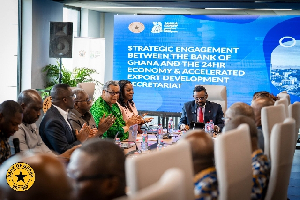It’s open knowledge to a section of the citizenry, including all Public Servants/ Public Officers that a constitutional requirement in the 1992 Constitution, Article 286, Clause (1) or better still, Section (1) of the Public Office Holders (Declaration of Assets and Disqualification) Act – 1998 (ACT 550) states that, “A person who holds a public office mentioned in Section 3 of this Act shall submit to the Auditor-General a written declaration of-
(a) all properties or assets owned by him; and
(b) all liabilities owed by him; whether directly or indirectly.
Public Officers are therefore required to comply with (a)(b): before taking office; at the end of every four years; and at the end of his/ her term of office but not later than six months.
A whole activation of Articles 187, and 188 gave birth to an Auditor-General and the Audit Service of Ghana respectively; the Head who is currently in the person of Mr. Daniel Yaw Domelevo. As part of his/ its constitutional mandate, the anticipation is to audit public accounts (books, records, returns and other relevant related documents) of all public institutions to promote transparency and accountability in the country’s governance structure; to help deal with the ever worsening corruption menace more effectively and efficiently. Should the Audit Service be tasked some more?
So, who then does the Constitution and or ACT 550 describes as a Public Servant/ Public Officer? It “means a person who holds a public office,” as fixated in Section (14) of ACT 550. This definition by far propels me to proffer a summary of the qualification of persons described in Article 286, Clause (5); and or Section (3) of ACT 550; thus, all elected and appointed Heads of all government or public institutions, and all such equivalent offices/ ranks that Parliament may propose.
THE NEED FOR SUCH LAWS AND ACT
On the 25th of July, 2017, on the Ghana Morning Ghana television political talk show, the NPP MP for Assin South constituency, Hon. Rev. John Ntim Fordjour subscribed to this school of thought, “What we must note is that corruption can only be fought according to law,” but perhaps forgot to establish that every act of fighting is fighting—attempting to kill is murder—right? In that light, it’s only rational to acknowledge that it takes considerable fierceness, determination and or tactfulness to win a fight—in this instance 100% enforcement of the requisite Laws and Acts will have to be applied to overcome corruption.
So, the urgent need for a near accurate, if not an entirely accurate formulation and stringent implementation of Laws and Act regarding assets declaration, simply has everything and everything else to do with the fight against graft. A menace that appears to be done creeping into all circles of the Ghanaian ecosystem, and is gradually being institutionalised in same circles—because it seemingly appears to be slithering in at a pace not less than the frequency at which our consciences are able to prompt us.
A general case in point as to why the menace is near full institutionalisation: the Auditor-General’s report in every given year, at least from the fourth republic, points to acts of gross unpardonable financial malfeasance and misappropriation on the part of most public institutions, especially the District Assemblies. These stories generate and degenerates huge news both in the traditional and online news media/ portals; yet, Heads of these public institutions are left off the hook and nothing educational becomes of the circumstance even after the annual Public Accounts Committee sittings—so, the delinquencies recur but in greater sums like nobody’s business.
THE AIMS OF SUCH LAWS AND ACT
The aims of such Laws and Act maybe numerous and varying, and these could be owed to the extent of needs vis-à-vis corruption that maybe identified in and by a given country—in this instance, Ghana. Below are some aims identified from an OECD paper, see report: OECD (2011), Asset Declarations for Public Officials: A Tool to Prevent Corruption, OECD Publishing. http://dx.doi.org/10.1787/9789264095281-en:
(a) to increase transparency and the trust of citizens in public administration, by disclosing information about assets of politicians and civil servants that shows they have nothing to hide;
(b) to monitor wealth variations of individual politicians and civil servants, in order to dissuade them from misconduct and protect them from false accusations, and to help clarify the full scope of elicit enrichment or other illegal activity by providing additional evidence.
A summary of the two points above suggests, “it (such Laws and Act) upholds both the public’s right to scrutinize a civil servant’s wealth and the civil servant’s need to protect him or herself from erroneous accusations of corruption, both in and out of office, through a constitutionally mandated process of annual asset declaration,” by a Guyanese online news portal, Stabroek News—see report: https://www.stabroeknews.com/2013/features/08/27/the-importance-of-asset-declarations-and-the-role-of-the-integrity-commission/
THE BONE OF CONTENTION: TRANSPARENCY VRS PRIVACY
This is the segment that appears to be breeding new arguments while igniting dead ones, when indeed there are no concrete substances and grounds to be determined; and I’m referring to campaigners of ‘Privacy’, i.e., some pols. Consider this: to what degree do these pols (mostly those in government) want to be proffered considerable privacy, when indeed they have everything, and I mean everything else, including all accesses and plenary controls over the nation’s resources—human and capital, as compared to the beggar by the roadside?
The above statement is by no means an assumption that pols the world over, especially in Ghana do not deserve a life; or better still, privacy—it is their moral right. However, the extent of that moral right diminishes to a large magnitude once one assumes a public office. I’m only stating the obvious—it is what it is.
You may wish to consider this too: that a decent principle of transparency in all facets of government only invents a civilized environment of probity and accountability that instills public confidence in public servants in and or public institutions; while that of privacy only fashions gross perceptions of varying units of graft and misconducts owing to acts shrouded in secrecy, which may not even be exact.
A case in point: the affable former Deputy Minister of Tertiary Education, and now NDC MP for North Tongu (V/R), Mr. Samuel Okudzeto Ablakwa had been accused severally of owning fleets of fuel stations in Accra as well as tanker vehicles; allegations he vehemently denied and even challenged the incoming Special
Prosecutor to probe—see report: https://www.ghanaweb.com/GhanaHomePage/NewsArchive/There-is-nothing-wrong-if-I-own-filling-stations-Samuel-Okudzeto-Ablakwa-556458
This piece “is principally an argument in support of the view that the social benefits of transparency can be achieved without compromising our right to privacy,” by Prof. G. Randolph Maye in Privacy and Transparency, and “it is logically and practically possible to respect the right to privacy in an increasingly transparent society,” ibid.
FOOD FOR THOUGHT
Firstly, I humbly concede I’m not a lawyer, indicating there maybe shortfalls in my line of interpretations vis-à-vis the respective Laws and Act cited above—so I stand corrected as I attempt making meaning of the existing circumstance.
An extensive perusal of the respective Laws and Act cited above, especially and as well as Article 287, Clause (1)(2)—COMPLAINTS OF CONTRAVENTION, all wholly related to the subject matter suggests a break in the exercise. Article 287 necessitates a full-blown investigation against a Public Officer(s) deemed to have contravened the Laws or Act on the subject matter; but for an initial perception by any individual, including ordinary citizens. This means, until anyone perceives wrongdoing, and or an act of corruption on the part of a Public Officer, such as that of the MP for North Tongu, and formerly petitions the Auditor-General, there’s no continuous vetting process of the initial and closing asset declarations of the alleged wrongdoer to ascertain a substance of wealth variations and or exactness in the said allegation.
This, I humbly suggest is almost entirely flawed since some acts of wrongdoing/ corruption are skillfully executed in a syndicate that may never and never come to the fore or public domain. So yes, I meekly think the Audit Service of Ghana should be tasked and equipped some more for a continuous vetting process, though it might attract extra administrative costs.
Prof. G. Randolph Maye argues once again, “that a properly administered transparency
can be the source of greater tolerance of individual differences and restraint in the treatment of wrong doers,” but in this instance, alleged wrongdoer(s) until further notice. With that said, respectfully Mr. President, could you please honour your campaign promise to declare your asserts publicly, as well as instructing all Public Officers captured in Article 286, Clause (5) to do same? Just like former and incumbent Presidents of Nigeria, Umaru Musa Yar'Adua and Muhammadu Buhari, respectively.
Also, the circumstances surrounding the yet-to-be passed RTI (Right To Information) Bill appears like a comic play for the theaters, but interesting enough, it doesn’t even serve such purpose; the NDC, while in government few months ago played tactics and refused to pass the Bill, even at the pressures from the then minority, NPP. And now, NPP who is currently in government is similarly playing such familiar tactics that might refuse the passage of the Bill. Hmm.
The Lord is my witness: a good number of the youth are targeting politics now with defective motives, thus to ‘steal’ and amass public wealth simply because of the blatant ‘create, loot, and share’ stories they hear nearly everyday that is progressively getting more familiar sans inviting a sense of worry.
Dear Lord, let it be that our national leaders and policy makers would at all times be guided in their scheme of things, with thoughts suggesting that posterity is taking notes.
Author: Nana Kwaku-Jr (JR DOCKET)
Opinions of Tuesday, 1 August 2017
Columnist: Nana Kwaku-Jr















